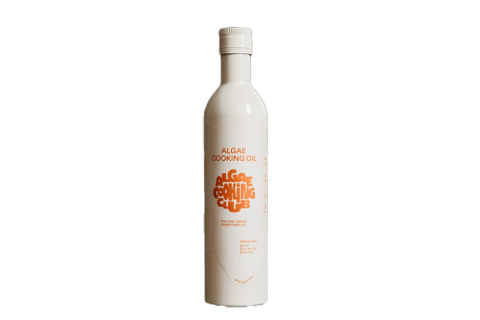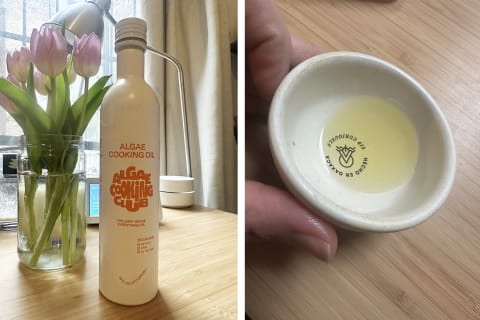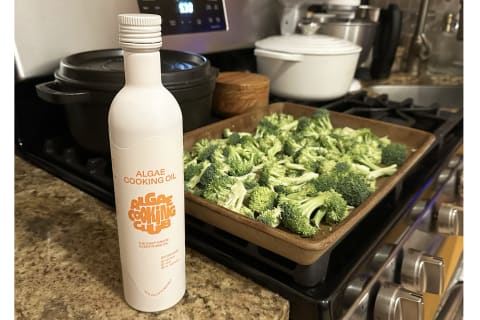Advertisement
This Oil Has 25% More Healthy Fats Than Olive Oil (Nope, Not Avocado!)


At least two bottles of oil sit on my countertop at all times. An avocado oil for cooking and an olive oil for roasting and drizzling.
But a new addition recently nestled its way into my lineup: algae oil.
Launched earlier this year by Algae Cooking Club, the chef-grade oil delivers a more sustainable alternative to avocados or olives with a few unexpected health benefits.
Eager to know whether this buttery cooking oil could replace my existing lineup, I exclusively used algae oil for one week to determine whether this $25 oil could truly replace my existing lineup. Here's the verdict.
Wait, why would you even want to use algae?
When I think of algae, my mind wanders to spirulina (one of my favorite superfood powders) or algal oil, a vegetarian source of vitamin D—not cooking.
And while I admit the bottle's sleek, opaque packaging initially drew me in, there are plenty of reasons to be impressed by this oil that go beyond branding:
- Algae oil has a smoke point of 535 degrees Fahrenheit. This is 125 degrees higher than olive oil and 5 degrees higher than avocado oil.
- Producing algae oil requires less land and emits less CO2 emissions than avocado and olive oils.
- Algae oil has 75% less saturated fat and 25% more omega-9 monounsaturated fat than olive and avocado oils.
- This cooking oil is certified glyphosate-residue-free, meaning you won't find any traces of the toxic herbicide in the mix.
Don't toss your current oil just yet!
Algae oil is an innovative addition to the (metaphorical) grocery store aisles—but it's not as well studied as its counterparts.
Antioxidants
Many of olive oil's health benefits tie back to its polyphenol compounds or antioxidants. While these free-radical-neutralizing compounds are found in most plants, they're known to be highly bioavailable1 in olives.
Yet researchers are still trying to understand the best way to assess antioxidants in microalgae2, which varies based on class and species.
Vitamin E
Along with oleic acid and polyphenols, olive oil's profile also includes vitamin E. Studies suggest around 90% of men and 96% of women have insufficient intake of vitamin E3—but just 1 tablespoon of olive oil can provide 13% of the recommended intake4.
Algae Cooking Club adds mixed tocopherols or vitamin E to its oil to unlock similar benefits.
How is algae oil even made?
When I first read about algae oil, I pictured a wide expanse of open water blooming with vibrant red microalgae. Instead, Algae Cooking Club opts for fermentation tanks for more control over production.
The cultivated algae swells up to 80% of its weight in oil in just three days, per the brand. Oil is then expressed from algae, keeping the supply chain short and streamlined.
It's important to note that algae oil doesn't actually contain algae. Instead, the final product is primarily monounsaturated or healthy fats, which can promote heart health5, lower cholesterol levels6, and reduce inflammation7.
High levels of monounsaturated fats have another perk; it makes it hard to blend algae oil with seed oils without impacting the flavor. Still, the brand tests each batch of oil twice to verify fatty acid composition.
So… how does it taste?
Although I'll spend a few minutes examining the nutrition label of any new foods I try, taste will always be my deal-breaker.
First things first, it's important to note this light oil does not taste like fish. Algae Cooking Club describes the flavor as slightly buttery; I'd argue that the oil is essentially flavorless.
It's not a bad thing. When I'm roasting broccoli, sautéing onions, or mixing batter for baked goods, I prefer oil that won't impact the flavor of what I'm concocting.
Still, I'll hold on to my olive oil when it's time to mix up homemade dressings. I prefer the rich flavor that it adds to my recipes, especially when infused with herbs and spices.
My week of using Algae Cooking Oil
As someone without a microwave, I use my stovetop a lot. During my week of testing out Algae Cooking Club, I used the oil to create at least a dozen meals (and warmed up another handful).
During this time, I became completely infatuated with algae oil. My kitchen is closed off without any windows, so I have to rely on an overhead vent and air purifier to circulate and refresh my air.
My smoke alarm goes off at least five times per a week—but it didn't go off once after I switched to algae oil. It might seem like a silly selling point to some until you've wasted countless hours under the smoke alarm frantically waving a cardboard box.
For me, a higher smoke point offers perks beyond protecting the oil's beneficial nutrients.
Do you really need algae oil?
As someone interested in sustainability and nutrition, I find the case for algae oil incredibly compelling. Between a lower carbon footprint and higher concentration of monounsaturated fats, there's a compelling case to keep algae oil in your rotation.
Yet I recognize how quickly the cost of this oil could add up. I kept the bottle in rotation for another week after my test officially ended, and I'm already halfway through the $25 bottle.
While I'm all for paying more for a quality oil—especially because it typically impacts the nutrient profile of an oil—I also recognize that the price might be steep for the 16-ounce bottle.
The final verdict
My first bottle of this chef-grade algae oil was a free sample from the brand for testing, but I fully intend to purchase the next one with my own money. The higher smoke point and extra boost of healthy fats make this oil worth the splurge—but I'll still keep olive oil around for all my dips, dressings, and drizzles.
7 Sources
- https://www.ncbi.nlm.nih.gov/pmc/articles/PMC2871118/
- https://www.ncbi.nlm.nih.gov/pmc/articles/PMC8537667/
- https://www.ncbi.nlm.nih.gov/books/NBK519051/
- https://fdc.nal.usda.gov/fdc-app.html#/food-details/171413/nutrients
- https://www.ncbi.nlm.nih.gov/pmc/articles/PMC4198773/
- https://www.ncbi.nlm.nih.gov/pmc/articles/PMC9266110/
- https://www.ncbi.nlm.nih.gov/pmc/articles/PMC6140086/

Why Nutrition Is Key To Changing Your Relationship With Alcohol
Brooke Scheller, DCN, CNS

Why Alcohol Sabotages Your Gut Health & How To Get Back On Track
Brooke Scheller, DCN, CNS

Why Nutrition Is Key To Changing Your Relationship With Alcohol
Brooke Scheller, DCN, CNS

Why Alcohol Sabotages Your Gut Health & How To Get Back On Track
Brooke Scheller, DCN, CNS

Why Nutrition Is Key To Changing Your Relationship With Alcohol
Brooke Scheller, DCN, CNS

Why Alcohol Sabotages Your Gut Health & How To Get Back On Track
Brooke Scheller, DCN, CNS

Why Nutrition Is Key To Changing Your Relationship With Alcohol
Brooke Scheller, DCN, CNS

Why Alcohol Sabotages Your Gut Health & How To Get Back On Track
Brooke Scheller, DCN, CNS

















